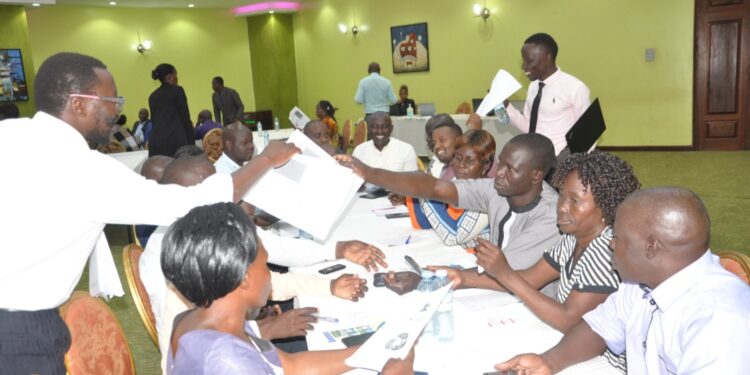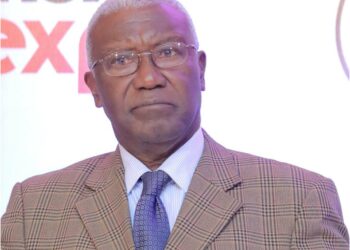By Mudecha Aramathani
In a significant stride towards bolstering Uganda’s public health preparedness, the USAID Social and Behavior Change Activity (SBCA) orchestrated a highly successful pre-test of the One Health Risk Communication and Community Engagement (RCCE) Toolkit. Held over two days on August 27-28, 2024, at Imperial Royale, Kampala, this workshop marked a pivotal moment in the nation’s ongoing efforts to enhance its capacity to respond effectively to public health emergencies.
A Critical Milestone for Public Health Preparedness
The workshop brought together an impressive assembly of national, sub-regional, and district-level stakeholders, alongside Global Health Security (GHS) Implementing Partners, to scrutinize and validate the draft RCCE Toolkit. The overarching goal of this initiative was to ensure that Uganda’s risk communication strategies are both comprehensive and inclusive, addressing the gaps highlighted in the Joint External Evaluation 3.00 under 5.2: Risk Communication & Community Engagement. These gaps, primarily revolving around the weak harmonization of risk communication messages across sectors and the absence of an integrated community engagement approach, are now set to be addressed by the newly pretested toolkit.
Dr. David Muwanguzi, the Incident Commander at the Ministry of Health, underscored the critical role of the One Health approach in Uganda’s public health landscape. “The One Health concept is fundamental to our mission as it transcends zoonotic diseases, encompassing a broad spectrum of threats, including chemical and biological hazards. This toolkit represents a significant step forward in ensuring that our risk communication strategies are not only robust but also inclusive, engaging all relevant stakeholders in the process,” he asserted.
Comprehensive Discussions and Invaluable Feedback
The workshop delved into the intricacies of the RCCE Toolkit, which is structured around three essential phases: Prevention, Response, and Recovery. Through a mix of group work, plenary sessions, and interactive Q&A segments, participants provided detailed feedback on the toolkit’s usability, relevance, and areas that required refinement.
During these discussions, participants highlighted the critical importance of ensuring the toolkit’s practical applicability across various levels—from national to community. They also stressed the need for the toolkit to be adaptable, allowing for customization based on the unique challenges faced by different regions. Dr. Dradiku A. Christopher, Operations Manager at the West Nile Public Health Emergency Operation Center (PHEOC), was particularly vocal about the toolkit’s potential to revolutionize risk communication efforts in his region. “The toolkit will be instrumental in organizing, coordinating, and conducting RCCE activities, especially in areas like West Nile, where we face a complex mix of public health challenges, including a high influx of refugees,” he noted.
The Call for a National One Health Policy
A particularly notable aspect of the workshop was the robust discussion surrounding the need for a formalized One Health National Policy. Several stakeholders emphasized that while the RCCE Toolkit is a crucial development, its success hinges on the establishment of a comprehensive national policy that enshrines the One Health approach within Uganda’s public health framework.
Participants argued that such a policy would not only provide a clear directive for the implementation of the RCCE Toolkit but also ensure that all relevant sectors—human health, animal health, and environmental health—are integrated into the country’s public health strategy. Dr. Fred Mwonje, a senior veterinary officer at the Ministry of Agriculture, Animal Industry, and Fisheries (MAAIF), echoed these sentiments, stating, “A National One Health Policy is essential to unify our efforts and ensure that our approach to public health is holistic. The policy would serve as a foundation upon which tools like the RCCE Toolkit can be effectively implemented, ensuring consistency and coordination across all levels.”
Stakeholders urged the relevant authorities to expedite the development of this policy, emphasizing that without it, the full potential of the RCCE Toolkit might not be realized. The consensus was that such a policy would not only enhance Uganda’s ability to respond to public health emergencies but also position the country as a leader in adopting the One Health approach within the region.
Refining the Toolkit: A Collaborative Effort
The pre-test also served as an opportunity for stakeholders to critically assess the toolkit’s three phases, providing insights that would be crucial for its finalization. The Prevention Phase, for instance, was lauded for its comprehensive approach to identifying and mitigating potential public health risks before they escalate. However, participants suggested that more emphasis should be placed on cross-border surveillance and the inclusion of non-traditional stakeholders, such as local governments and community-based organizations, in early detection efforts.
The Response Phase prompted a lively debate on the toolkit’s capacity to mobilize resources and coordinate efforts during a public health crisis. Participants called for the inclusion of clear guidelines on resource allocation and the establishment of a centralized command structure to streamline decision-making during emergencies. Dr. Muwanguzi remarked, “In times of crisis, a well-defined response protocol is critical. The toolkit should provide not just a framework but also practical steps for activating a coordinated response across all sectors.”
Finally, the Recovery Phase was discussed in detail, with participants emphasizing the need for a sustained effort to rebuild and strengthen public health systems post-crisis. There was a strong consensus that the toolkit should include mechanisms for monitoring and evaluating recovery efforts, ensuring that lessons learned are integrated into future preparedness plans.
Bridging Gaps and Strengthening Capacity
Throughout the workshop, it became evident that the RCCE Toolkit is more than just a set of guidelines—it represents a shift towards a more integrated and proactive approach to public health in Uganda. By engaging a wide range of stakeholders, from government officials to community leaders, the toolkit aims to bridge the gaps in Uganda’s current risk communication strategies, making them more cohesive and effective.
Richardson Mafigiri, Epidemiologist and RCCE Lead at the EOC in Mbarara expressed his appreciation for the workshop, noting that it was a timely intervention in the country’s public health journey. “This workshop has not only validated the RCCE Toolkit but also provided a platform for critical discussions that will shape the future of risk communication in Uganda. I urge all stakeholders to take ownership of this toolkit and work closely with the Regional EOCs to ensure its successful implementation,” he said.
Looking Forward to the next steps
With the pre-test phase now complete, the focus shifts to finalizing the toolkit based on the comprehensive feedback received during the workshop. The finalized toolkit will then be disseminated across all levels—from national to community—ensuring that it is accessible to all stakeholders involved in public health.
Moreover, the discussions on the need for a National One Health Policy will likely catalyse efforts toward its development, with stakeholders recognizing that such a policy is integral to the successful implementation of the RCCE Toolkit.
As the workshop concluded, there was a palpable sense of achievement and optimism among the participants. The successful pre-test not only validated the RCCE Toolkit but also reaffirmed the importance of a collaborative, multi-sectoral approach to managing public health risks. With the RCCE Toolkit, Uganda is poised to significantly enhance its capacity to respond to future health emergencies, ensuring that all communities, regardless of their location, are well-prepared and resilient.
The One Health RCCE Toolkit is set to become a cornerstone of Uganda’s public health strategic development. The success of the pre-test underscores the critical role of risk communication and community engagement in safeguarding public health and the positive impact of the One Health approach in achieving these goals. As Uganda moves forward, the RCCE Toolkit, supported by a potential National One Health Policy, will ensure that the country is better equipped to tackle public health challenges, now and in the future.
Do you have a story in your community or an opinion to share with us: Email us at editorial@watchdoguganda.com













